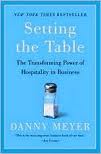The following is a book review done for Mobility Magazine by our very own Beth Archibald.
Book by Danny Meyer
Reviewed by Beth Archibald, SCRP, SGMS
Q: When asked about the book you wanted to feature,
you immediately focused on Setting the Table: The
Transforming Power of Hospitality in Business. It
seems to have had a significant influence on you.
What was so appealing about it?
A: I loved that the book spent time on what’s most
meaningful in creating positive, uplifting outcomes
for human experiences and human relationships.
Business, like life, is all about how you make people
feel. It’s that simple, and it’s that hard! I always
want people to feel good, and I enjoy the relationships
that I build by treating people with respect
and dignity.
Q: This is one of those business books that is something
of an unusual connection for our industry.
How is the restaurant business a parallel to what
happens in the mobility arena?
A: Hospitality is the foundation of my business philosophy.
Virtually nothing else is as important as
how one is made to feel in any business transaction.
Hospitality exists when you believe the other person
is on your side. The converse is just as true. As the
author says, “Hospitality is present when something
happens for you. It is absent when something
happens to you. Those two simple prepositions—for and to—express it all.”
Relocation is a relationship business, and how we make people feel in the process
is paramount to our success.
Q: Explain what Danny Meyer means by “turning over
the rocks” to learn more about customers.
A: He’s talking about what makes a business different
and special. It’s about turning over the rocks—getting
to know all about your customer and remembering
what is important to them. We must exceed expectations
by employing a caring staff and using the finest
ingredients, just as a restaurant would. This book
helped me understand the difference between service
and hospitality. Service is the technical delivery of
a product. Hospitality is how the delivery of that
product makes its recipient feel—and I believe it takes
both service and great hospitality to rise to the top.
Q: The author talks about using “constant gentle pressure”
to keep his business centered. He also shows
that nice guys finish first, not last! How have you
applied that to your own business?
A: After reading this book, I believe we can achieve
our business goals of extending warm hospitality
while performing at a high level of excellence
because we hire strong emotional and technical
people. Emotional skills are called the “excellence
reflex” in the book. The excellence reflex is
a natural reaction to fix something that isn’t right
or to improve something that could be better. The
overarching concern to do the right thing well is
something we strive to do. We have applied this
concept to hiring optimistic, warm, and intelligent
individuals who have a good work ethic and have
the empathy to connect with those who are relocating.
Personal integrity is also a major ingredient for
success—doing the right thing with honesty and
super judgment.
Q: If you wrote a business book, what would the title be?
A: The Art of Creative, Profitable Problem-Solving. If we
genuinely cared more for each other, our business
world would be able to solve problems in the most
effective way. As Danny Meyers says, “The worst
mistake is not to figure out some way to end up in a
better place after having made a mistake!”




